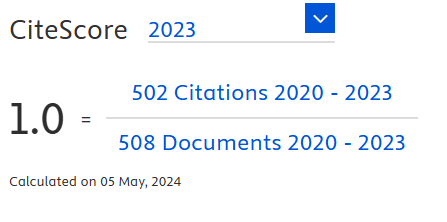Ovarian Gene Transcriptional Responses To Antidepressant Drugs (Imipramine And Fluoxetine) In Female Wistar Rats
DOI:
https://doi.org/10.18006/2023.11(3).593.597Keywords:
Imipramine, Fluoxetine, Gene, RT-PCR, Bcl-2, RatsAbstract
This study was designed to investigate ovarian gene transcriptional responses to selected antidepressant drugs (imipramine and fluoxetine) in female rats. Fifteen female rats (120 – 140 g) were used for this study. Imipramine (0.71 mg/kg) and fluoxetine (0.57 mg/kg) were given orally for 50 days. The method of RT-PCR was employed to investigate the expressions of FSH-R, p53 and Bcl-2 genes. Graphics were generated as mean +/- SEM using GraphPad Prism version 8.0. Results of the study revealed that the FSH-R, p53 and Bcl-2 expressions were significantly (p<0.05) up-regulated in the imipramine-treated rats relative to their controls. Conclusively, it can be suggested that imipramine induced follicular growth and apoptosis in female Wistar rats.
References
Ali, H.S.N. (2022). Antidepressant’s long-term effect on cognitive performance and cardiovascular system. Cardiometry, 23, 76-88. DOI: https://doi.org/10.18137/cardiometry.2022.23.7688
Alicia, M.C., & James, M.O. (2002). Effects of antidepressants in rats trained to discriminate centrally administered isoproterenol. Journal of Pharmacology and Experimental Therapeutics, 302 (2), 606-611. DOI: https://doi.org/10.1124/jpet.102.034686
Barth, M., Kriston L., Klostermann, S., Barbui, C., et al. (2016). Efficacy of selective serotonin reuptake inhibitors and adverse events: meta-regression and mediation analysis of placebo-controlled trials. The British Journal of Psychiatry, 208 (2), 114–119. DOI: https://doi.org/10.1192/bjp.bp.114.150136
Boise, L.H., Gonzalez-Garcia, M., Postema, C.E., Ding, L., et al. (1993). Bcl-x, a bcl2-related gene that functions as a dominant regulator of apoptotic cell death. Cell, 74, 597–608. DOI: https://doi.org/10.1016/0092-8674(93)90508-N
Choudhuri, T., Pal, S., Agwarwal, M.L., Das, T., et al. (2002) Curcumin induces apoptosis in human breast cancer cells through p53-dependent Bax induction. Federation of European Biochemical Societies Letters, 512, 334–340. DOI: https://doi.org/10.1016/S0014-5793(02)02292-5
Cipriani, A., Furukawa, T.A., Salanti, G., Chaimani, A., et al. (2018). Comparative efficacy and acceptability of twenty-one antidepressant drugs for the acute treatment of adults with major depressive disorder: a systematic review and network meta-analysis. Lancet, 391 (10128), 1357–1366. DOI: https://doi.org/10.1016/S0140-6736(17)32802-7
Cipriani, A., Zhou, X., Del Giovane, C., Hetrick, S.E., et al. (2016). Comparative efficacy and tolerability of antidepressants for major depressive disorder in children and adolescents: a network meta-analysis. Lancet, 388 (10047), 881–890. DOI: https://doi.org/10.1016/S0140-6736(16)30385-3
Dewailly, D., Robin, G., Peigne, M., Decanter, C., et al. (2016). Interactions between androgens, FSH, anti-Mullerian hormone and estradiol during folliculogenesis in the human normal and polycystic ovary. Human Reproduction Update, 22, 709–724. DOI: https://doi.org/10.1093/humupd/dmw027
Dimitry, F., Ariana, M.L., Eric, J.K., & Babatunde A. (2017). Antidepressant-induced sexual side effects: incidence, assessment, clinical implications, and management. Psychiatric Annals, 47, 3. DOI: https://doi.org/10.3928/00485713-20170201-01
Ebrahim, A.S., Sabbagh, H., Liddane, A., Raufi, A., et al. (2016). Hematologic malignancies: newer strategies to counter the BCL-2 protein. Journal of Cancer Research and Clinical Oncology, 142, 2013–2022. DOI: https://doi.org/10.1007/s00432-016-2144-1
Eduardo, M.B., Rogelio, P., Michael, J.R., José, A.M., et al. (2022). Investigation of the DNA Damage and Oxidative Effect Induced by Venlafaxine in Mouse Brain and Liver Cells. Toxics, 10 (12), 737. DOI: https://doi.org/10.3390/toxics10120737
Filiou, M.D., Moy, J. , Wang, M., Guillermier, C., et al. (2014). Effect of an antidepressant on mouse hippocampus protein turnover using MIMS. Surface and Interface Analysis, 46 (Suppl 1): 144-146. DOI: https://doi.org/10.1002/sia.5616
Fridman, J. S., & Lowe, S. W. (2003). Control of apoptosis by p53. Oncogene, 22(56), 9030–9040. https://doi.org/10.1038/ sj.onc.1207116. DOI: https://doi.org/10.1038/sj.onc.1207116
Gabriel, M., & Sharma, V. (2017). Antidepressant discontinuation syndrome. Canadian Medical Association Journal, 189 (21), E747. DOI: https://doi.org/10.1503/cmaj.160991
Healy, D., Noury, L.J., & Manginb, D. (2018). Enduring sexual dysfunction after treatment with antidepressants, 5α-reductase inhibitors and isotretinoin: 300 cases. International Journal of Risk & Safety in Medicine, 29 (3), 125–134. DOI: https://doi.org/10.3233/JRS-180744
Jakobsen, J.C., Gluud, C., & Kirsch, I. (2020). Should antidepressants be used for major depressive disorder?British Medical Journal Evidence-Based Medicine, 25 (4), 130. DOI: https://doi.org/10.1136/bmjebm-2019-111238
Jamnongjit, M., & Hammes, S.R. (2006). Ovarian steroids: the good, the bad, and the signals that raise them. Cell Cycle, 5, 1178–83. DOI: https://doi.org/10.4161/cc.5.11.2803
Jennings, L. (2018). Antidepressants. In G., Grossberg, & L. Kinsella, (eds.). Clinical psychopharmacology for neurologists: a practical guide (pp. 45–71), Springer, Cham. https://doi.org/10.1007/978-3-319-74604-3_4. DOI: https://doi.org/10.1007/978-3-319-74604-3_4
Jordan, M., Marie-Line, R., Eleonora, G., Cecilia, G., et al. (2014). The effects of antidepressant treatment in prenatally stressed rats support the glutamatergic hypothesis of stress-related disorders. Journal of Neuroscience, 34 (6), 2015-2024. DOI: https://doi.org/10.1523/JNEUROSCI.4131-13.2014
Jue, Z., Fan, Q., Yue, J., & Dong-Xia, Y. (2014). The Extracts of Pacific Oyster (CrassostreaGigas) Alleviate Ovarian Functional Disorders of Female Rats with Exposure to Bisphenol a Through Decreasing FSHR Expression in Ovarian Tissues. African Journal of Traditional and Complementary Alternative Medicine, 11 (5), 1–7. DOI: https://doi.org/10.4314/ajtcam.v11i5.1
Kazuko, S., Joshua, R.M., Sean, M.D., Meghan, G.V., et al. (2013). Effects of antidepressant treatment on mice lacking brain-derived neurotrophic factor expression through promoter IV. European Journal of Neuroscience, 37 (11), 1863-1874. DOI: https://doi.org/10.1111/ejn.12148
Majid, S., Malihe, S., Seyed-Hosein, A., Vahid, N., et al. (2019). Effect of hydro-alcoholic extract of Oleaeuropaea on apoptosis-related genes and oxidative stress in a rat model of torsion/detorsion-induced ovarian damage. Asian Pacific Journal of Reproduction, 8 (4), 148-156. DOI: https://doi.org/10.4103/2305-0500.262831
Mohammad K.R, Seyed-Hosein A., Majid S., Masoumeh F., et al. (2022). Protective effect of minocycline on Bax and Bcl-2 gene expression, histological damages and oxidative stress induced by ovarian torsion in adult rats. International Journal of Fertility and Sterility, 16(1), 30–35.
Nasrallah, H.A., Tracy, H., & Sarah, K.P. (2010). Differential effects of antipsychotic and antidepressant drugs on neurogenic regions in rats. Brain Research, 1354, 23-29. DOI: https://doi.org/10.1016/j.brainres.2010.07.075
Nori-Garavand, R., Hormozi, M., Narimani, L., BeigiBoroujeni, N., et al. (2020). Effect of selenium on expression of apoptosis-related genes in cryomedia of mice ovary after vitrification. Biomedical Research International, 2020, 5389731. DOI: https://doi.org/10.1155/2020/5389731
Oltvai, Z.N., Milliman, C.L., & Korsmeyer, S.J. (1993). Bcl-2 heterodimerizes in vivo with a conserved homolog, Bax, that accelerates programmed cell death. Cell, 74, 609–619. DOI: https://doi.org/10.1016/0092-8674(93)90509-O
Omotuyi, O.I., Nash, O., Enejoh, O.A., Oribamise, E.I., et al. (2020). Chromolaena odorata flavonoids attenuate experimental nephropathy: Involvement of pro-inflammatory genes downregulation. Toxicological Report, 7, 1421-1427. DOI: https://doi.org/10.1016/j.toxrep.2020.10.006
Omotuyi, O.I., Nash, O., Inyang, O.K., Ogidigo, J., et al. (2018). Flavonoid-rich extract of chromolaena odorata modulate circulating glp-1 in wistar rats: Computational evaluation of tgr5 involvement. 3 Biotech, 8(2), 124. DOI: https://doi.org/10.1007/s13205-018-1138-x
Rahn, R. M., Maloney, S. E., Brier, L. M., Dougherty, J. D., & Culver, J. P. (2019). Maternal Fluoxetine Exposure Alters Cortical Hemodynamic and Calcium Response of Offspring to Somatosensory Stimuli. eNeuro, 6(6), ENEURO.0238-19.2019. https://doi.org/10.1523/ENEURO.0238-19.2019 DOI: https://doi.org/10.1523/ENEURO.0238-19.2019
Sansone, R. A., & Sansone, L. A. (2010). Gratitude and well being: the benefits of appreciation. Psychiatry (Edgmont (Pa. : Township)), 7(11), 18–22.
Seyedeh-Roza, T.N., Arash, K., Shamci, A., Majid S., et al. (2021). Protective effect of hydroalcoholic extract of orange peel on PCNA and FSH-R gene expression in histological damage and oxidative stress due to ovarian torsion in adult rats. International Journal of Women’s Health and Reproduction Sciences, 9 (3), 205–211. DOI: https://doi.org/10.15296/ijwhr.2021.38
Ukwade, C. E., Ebuehi, O. A. T., Adisa, R. A., Singh, S. K., & Singh, R. (2020). Anti-proliferative activities of Byrsocarpus coccineus Schum. and Thonn. (Connaraceae) using ovarian cancer cell lines. Journal of ovarian research, 13(1), 83. https://doi.org/10.1186/s13048-020-00679-8 DOI: https://doi.org/10.1186/s13048-020-00679-8
Downloads
Published
How to Cite
License
Copyright (c) 2023 Journal of Experimental Biology and Agricultural Sciences

This work is licensed under a Creative Commons Attribution-NonCommercial 4.0 International License.












